- Home
- Julia James
Carrying His Scandalous Heir Page 14
Carrying His Scandalous Heir Read online
Page 14
Conversation had been awkward—how could it have been otherwise?—and after enquiring how she was, and how she had spent the rest of the day, his voice constrained, he had informed her in an even more constrained fashion that he would be flying to the USA the next day to see Francesca.
She had been understanding of his reasons—but as she’d hung up she’d felt a wave of guilt go through her.
He didn’t ask for this! He didn’t ask for me to present him with my pregnancy, turning his life upside down as it has!
And the woman who’d thought she would be marrying Cesare—her life was being turned upside down as well. Ripped out from under her.
By me—by my giving in and agreeing to marry Cesare. Who feels he has no choice but to marry me.
Just as she had tried to force Vito to marry her. Making him do what she wanted. Ripping up his life. Ripping up the life he had been planning to make with that blonde English girl he was now so urgently seeking.
She closed her eyes in misery.
Haven’t I done enough damage to people? Do I have to ruin Cesare’s life too—and his fiancée’s?
The knowledge hung darkly, bleakly inside her.
Silently, she ran her mind back, thinking of the father she could not remember—had scarcely known. For the first time she thought of how he must have felt, told that he had to marry a woman he did not love because she carried his child. Had he had other plans? Other dreams? Dreams that had been smashed to pieces? Of a life he’d wanted to live and that had been barred to him?
Just as her pregnancy was barring Cesare from having the life he wanted. Requiring him to do his duty, take her for his wife instead of the woman he wanted to marry.
A cry sounded in her head.
I don’t want to force Cesare to marry me!
She felt her heart constrict. Memory poured in around it.
I had my happiness here—as much as I could ever have with Cesare. I knew from the start it was all I could have with him. That he could never be mine—not the way I came to long for him to be.
She felt her eyes distend, looking back into the past, the days and nights she had spent with Cesare. Then looking into the future she had now committed herself to—becoming his wife, his contessa, but not the one he had chosen of his own free will.
I can’t do this to him.
With a sudden impulse she threw back the bedclothes, her hand automatically easing across her abdomen as she got up. Inside—invisible, almost intangible—new life was growing.
She felt her throat close with sudden, overpowering emotion.
This is Cesare’s gift to me. Not his heart, but his child. And it will be enough.
With swift, resolute movements she dressed, repacked her case, headed downstairs. She needed to find Lorenzo—needed him to summon her a taxi to the airport. Needed to do what she knew she must do—set Cesare free.
* * *
With heavy tread Cesare walked down the ornate staircase to the piano nobile of the eighteenth-century section of the castello. He was booked on a flight to the USA, and his helicopter pilot was on standby now to fly him to the airport. He’d emailed Francesca last night, to let her know of his impending visit—but had given no indication of his purpose. It would be a shock to her, what he must tell her, but it was one he had no choice but to inflict.
Yet again, as it had done the previous afternoon, across his mind flashed the image of that Luciezo portrait. The ancestor who had had complete freedom of choice in his life. He ejected the image. What was the point of thinking about his forebear? His own life afforded no such freedom of choice.
Abruptly he went into his office, snapped on his laptop, dragging his mind back to the present and all the difficulties that enmeshed him. He must check to see if Francesca had replied to his email. She had—but it took him a moment to steel himself to open it. The enormity of what he was going to have to do to her weighed upon him. She did not deserve it.
Yet nor does Carla deserve to have to marry me. She made it clear enough to me yesterday how reluctant she is!
And he—what did he feel about it?
He veered his mind away. That was a path he did not wish to follow. Not now. Not yet. First he must smash up Francesca’s life.
He clicked open her email. Made himself focus on what she had written. For an instant, her words blurred, then resolved.
He started to read.
My dearest Ces, your email has been a catalyst for me. I have something I can no longer delay telling you.
He read on, disbelievingly.
Then, as the full impact of what she had written hit him, he sat back, his chest tight. Slowly he reached to close down his laptop. He would reply—but not yet. For now he could only sit there. Taking in what she had written. Taking in the implications.
A discreet knock sounded on his office door. At his abstracted permission to enter, his archivist came in.
‘The papers you asked after yesterday,’ he said, placing a leather-bound folder in front of Cesare. ‘This is Count Alessandro’s private journal.’
Cesare thanked him, his manner still absent, his mind still elsewhere. Then, as if to shake his thoughts from him, he reached for the folder and opened it, bringing out a marbled notebook, its pages mottled with age, covered in thin, flowing script. Sixteenth-century Italian, difficult to decipher.
But across the centuries his ancestor’s words reached to him. And as he read a frown started across his face. He read on in silence, his expression sombre. Then, at last, he lifted his eyes from the page, from the ink scored so deeply into the antique paper, as if reverberating still with the vehemence of his ancestor.
For a long while he sat. Feeling emotion swirl deep within him—turbid, inchoate. Making sense of what he’d read. Seeing, too, the printed words on his screen—Francesca’s email—melding with the antique script in front of him.
Then, with a sudden intake of breath, he pushed back his chair. He needed to stand down his helicopter pilot. And he needed to drive back to Lazio.
He was halfway to the door when he felt his phone vibrate in his jacket pocket. He pulled it out, glanced at the screen.
A voicemail.
From Carla.
He stilled. Pressed ‘play’.
And everything in his world changed again...
CHAPTER TWELVE
CARLA WAS SWIMMING—slowly but steadily ploughing up and down the length of the pool at her mother’s villa. Had it really only been a week since she’d made her decision to set Cesare free?
As she climbed out of the water she felt a familiar tightening of her chest—an ache of emotion burning within her. Regret? Could it be that? Regret at having walked away from the one chance she would have to be part of Cesare’s life?
No—marriage to Cesare like that would have been unbearable! She had told him so, and it was true. True, true, true. So that was what she must hold to—all that must guide her now. However hard it was.
‘Darling, are you all right? You mustn’t overdo it.’
Marlene’s voice was concerned as she hurried forward with an enveloping towel, draping it around Carla’s wet back.
Carla smiled her thanks, taking a seat in the sunshine while her mother fussed about her. Her mother had been fussing...hovering...ever since she’d arrived back from Italy. And as she’d heard her daughter out Carla had seen the reaction in her face.
‘He’s offered to marry you?’ she’d said.
Her eyes had worked over Carla. Then slid away into her own past.
‘The decision must be yours,’ Marlene had said slowly. ‘But for my part I think it’s the right one—the decision you’ve made.’ She’d paused a moment before continuing. ‘Marrying your father was the worst mistake I made. I’d hoped it would make him love me. But it did th
e opposite. He married me because of pressure from his father, who held the purse strings and did not want any scandal. But when his father died—you were only a toddler—he took off.’ She’d paused again. ‘When he was killed in that car crash there was a woman with him—and he’d just filed for divorce.’
She’d looked at her daughter, her eyes troubled.
‘I ruined his life—and marriage brought no happiness for me either.’ She’d taken a breath, exhaled sadly. ‘No happy ending—for me or for him.’
No happy ending...
The words hovered in Carla’s mind. Her mother’s sorry tale only confirmed the rightness of her decision to leave Italy, to tell Cesare in that solitary voicemail that it was all she could face doing—that she preferred single motherhood to forcing him to marry her instead of the woman he wanted to marry.
‘Go back to her, Cesare, and make the marriage you have always been destined to make. I don’t want to be the one to part you from her—not for any reason. She is the woman you chose for your wife, not me. The time we had together was very...very special to me. But it is over. I wish you well. This is my choice. Please do not try and dissuade me from it.’
She had had no reply. Knew that she must be glad she had not. Knew that she must be glad she had set him free. Must bear the pain that came with that.
To have nothing of him... Nothing—just as I had when he left me—nothing of him.
Yet as she sat sipping at her iced fruit juice, feeling the Spanish summer heat warm her damp limbs, her hand slipped to curve around the swell of her abdomen.
No, not nothing. This is Cesare’s gift to me.
And memories—memories that she would never lose. Never!
Cesare reaching for her, taking her mouth with his, slow and seductive, arousing and sensual, taking his fill of her as her hands stroked his smooth, hard body, glorying in the feel of it beneath her exploring, delicately circling fingertips.
Cesare, his body melded with hers in the white heat of passion, desire burning with a searing flame, until she cried out, her body arching in ecstasy, the ecstasy of his possession...
A possession she could never know again.
She felt that ache form in her chest again, around her heart. An ache that would never leave her. Could never leave her. The ache of a broken heart that could never mend. She could never have the man she loved, loving her in return.
No happy ending...
* * *
Cesare walked up the wide, imposing staircase to the panelled, gilded galleria. Along the walls priceless Old Masters marched on either side. But he did not look at them. He went only to the far end of the long room. Stood before the triptych, letting his eyes rest on the three portraits, thinking of their tangled, entwined lives.
Once he had thought he knew them...presumed to know them...these three people from so long ago. Thought to know his ancestor, whose blood ran in his veins. The ancestor who had been free to choose, flanked by the women either side of him. The woman he’d chosen for his wife. The woman he’d chosen for his mistress.
Free to choose.
Abruptly, he turned away. Nodded at the two men waiting patiently at the entrance to the galleria.
‘You can remove it now,’ he told them.
Without a backward glance, he walked out of the room.
His expression was unreadable. But emotion was heavy within him. Weighing him down. In his head he heard, over and over again, as he had done since he had first listened to her voicemail, Carla’s farewell to him.
‘This is my choice. Please do not try and dissuade me from it.’
Behind him he heard the sounds of the triptych being taken down, dismantled. Packed up.
He walked on, face set.
* * *
Carla was breakfasting with her mother. The weather was cooler today now, and she was glad. Glad, too, that by the time she was in late pregnancy she would be cooler still.
As it did so often, her hand glided protectively over her abdomen. Her thoughts were full. She must stay calm, serene. Let no agitation break through—no emotion or trauma. She had chosen this path—single motherhood—over a tormented marriage to Cesare. It had been the right choice to make.
Her expression changed. Vito was appalled that she was not going to marry Cesare, but she remained adamant. She would not be swayed. And, for himself, Vito had finally found a ray of hope in his search for the woman she had caused to flee. She might have been located at last. She wished him well—hoped that he would find the happiness he sought.
As for herself—well, happiness was beyond her now. Cesare had accepted her decision. She had heard nothing more from him.
I grew up fatherless, and my child will too. But it will have me, and my mother, and safety and love, and that is all that really matters.
That was what she told herself. That was what she must believe. As for Cesare—well, he would marry his marchese’s daughter and live the life he had always planned.
And I will have his child—his gift to me.
It was more than she had ever hoped to have of him. She must be content with that. In time her battered heart would heal, and Cesare would have no place in it any longer.
A sliver of pain pierced her, but she ignored it. Soon, surely, it would cease. The ache in her heart would ease. It must.
It must.
‘The mail, señora.’
Her mother’s maid was placing a stash of post on the table, breaking Carla’s painful reverie. Idly, she watched her mother sort it, then pause.
‘This is for you,’ she said, holding up a bulky envelope, her expression wary.
Carla felt herself tense—the stamp was Italian, the dark, decisive handwriting instantly recognisable. Steeling herself, she opened it, taking out several folded papers.
It will be some sort of legal document I have to sign, foregoing any claim on his estate for the baby, or a contract making me a maintenance allowance or something.
But as she unfolded them she gasped. It was neither of those things.
‘Darling, what is it?’ Marlene’s voice was immediately alarmed.
Carla stared, then looked blankly across at her mother. In a hollow voice she spoke. ‘It’s from a secure art vault in Rome. It tells me...’ She swallowed. ‘It tells me that the Luciezo-Caradino triptych is now in storage. That it is being held in trust—for...for...’
Instinctively her hand went to her ripening abdomen, her eyes distending. She dropped the letter, seized up the piece of paper with Cesare’s handwriting, and the third folded document.
‘Mum, I—I—’
She could say no more—only got to her feet, stumbling slightly as she walked away, past the pool, to find the bench underneath the shade of the bougainvillea arbour, overlooking the beach.
She sat down with trembling legs. Opened Cesare’s letter to read it. The writing came into focus, burned into her retinas—Cesare’s words to her.
I have made this bequest to you not only for the child you carry but as a token—a symbol of what is between us. To understand why, I ask you to read the enclosed. It is a typed transcript from the personal diary of Count Alessandro, who was portrayed by Luciezo.
Read it now, before you read more of this letter.
She let the page fall to her lap, then unfolded the transcript with fumbling fingers. Made herself read it. The Italian was old-fashioned, with some words she did not know. But as she read she felt the world shift and rearrange itself.
Slowly, with a hollow feeling within her, she set it aside, picked up Cesare’s letter again. Resumed reading.
It was brief.
I will not make the mistake he made. Whatever decision you now make, know that I am not my ancestor.
It was signed starkly, simply, with his name: Cesare.
Carefully—very, very carefully—her heart hammering in her chest, she put the papers back in the envelope. Then she went up onto the patio, where her mother was anxiously looking for her.
Marlene started to get to her feet, but Carla stayed her.
‘I have to go to him,’ she said.
Her voice was strange. Hollow. Her heart was filling with an emotion she could feel overwhelming her, drowning her.
* * *
The hire car ate up the miles, racing along the autostrada across the lush countryside of Lazio as she snaked ever upwards into the mountainous terrain, gaining at last, as darkness fell, the mighty stone entrance to the massive bulk of the Castello Mantegna.
I will not make the mistake he made.
Slowly, she made her way to the gate, looked at the walls of the castello louring over her. A postern door was set into the towering iron-studded gates, with an ancient metal bell-pull beside it. And a more modern intercom and surveillance camera.
She pressed the buzzer, giving her name. There was silence—complete and absolute silence. No response at all from within that stony fastness.
Her head sank. Defeat was in the slump of her shoulders.
Fool! Oh—fool, fool, fool!
The words berated her, like blows.
‘Signorina! Prego—prego!’
The man at the now open postern gate was in the uniform of a security guard—which, Carla realised dimly, given the value of the artworks within, even without the priceless triptych, made sense. He was beckoning her frantically.
Heart in her mouth, she stepped inside, through the gate into the vast, cobbled courtyard within. The guard was apologising fervently, but her eyes were darting either side to the ranks of former stables, now garaging, and the old medieval kitchens, now staff and estate office quarters. Both wings were utterly dominated by the huge mass of the castello itself, rising darkly ahead of her.
Dusk was gathering in this huge paved courtyard, and security lights were coming on as she was conducted across it to a pair of palatial iron-studded doors that were being thrown open even as she spoke. Inside, she could see a huge, cavernous hall, brilliantly lit with massive candelabras. And across it, striding rapidly, came the figure of the man she had come to brave in his mountain fastness.

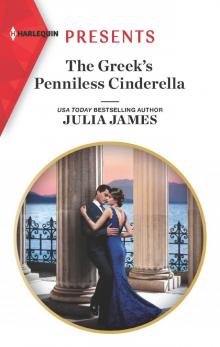 The Greek's Penniless Cinderella
The Greek's Penniless Cinderella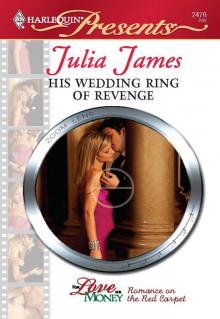 His Wedding Ring of Revenge
His Wedding Ring of Revenge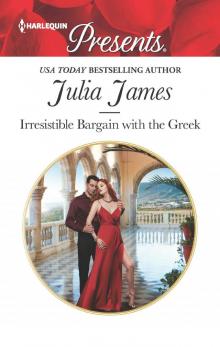 Irresistible Bargain with the Greek
Irresistible Bargain with the Greek Billionaire's Mediterranean Proposal
Billionaire's Mediterranean Proposal The Dark Side of Desire
The Dark Side of Desire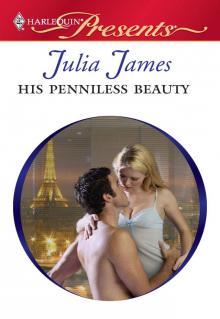 His Penniless Beauty
His Penniless Beauty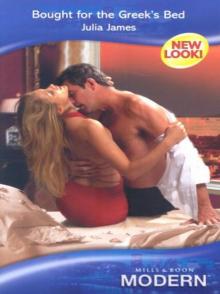 Bought ForThe Greek's Bed
Bought ForThe Greek's Bed For Pleasure...Or Marriage?
For Pleasure...Or Marriage? Carrying His Scandalous Heir
Carrying His Scandalous Heir Captivated by the Greek
Captivated by the Greek The Mistress's Secret
The Mistress's Secret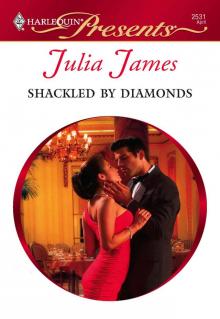 Shackled by Diamonds
Shackled by Diamonds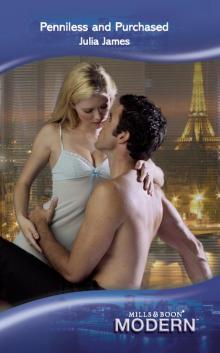 Penniless and Purchased
Penniless and Purchased The Greek's Virgin Bride
The Greek's Virgin Bride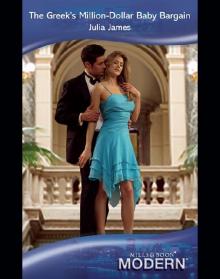 The Greek's Million-Dollar Baby Bargain
The Greek's Million-Dollar Baby Bargain Forbidden or For Bedding?
Forbidden or For Bedding?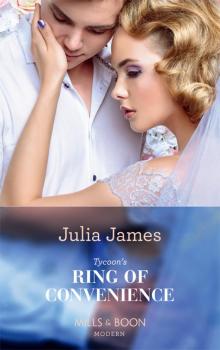 Tycoon's Ring of Convenience
Tycoon's Ring of Convenience Royally Bedded, Regally Wedded
Royally Bedded, Regally Wedded From Dirt to Diamonds
From Dirt to Diamonds The Forbidden Touch of Sanguardo
The Forbidden Touch of Sanguardo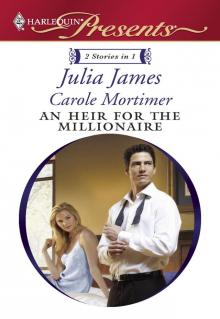 An Heir for the Millionaire
An Heir for the Millionaire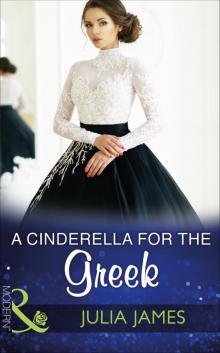 A Cinderella for the Greek
A Cinderella for the Greek Painted the Other Woman
Painted the Other Woman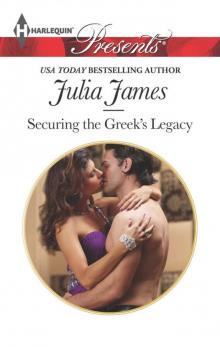 Securing the Greek's Legacy
Securing the Greek's Legacy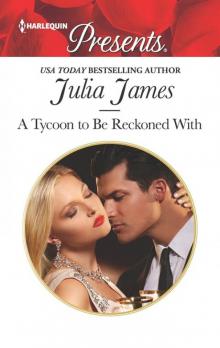 A Tycoon to Be Reckoned With (Harlequin Presents)
A Tycoon to Be Reckoned With (Harlequin Presents) Summer Sins
Summer Sins